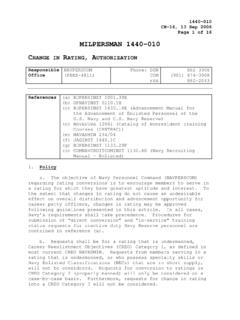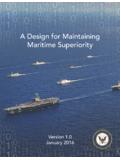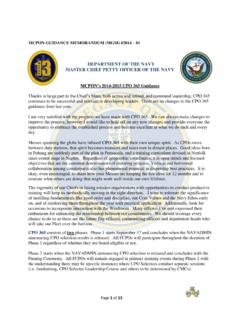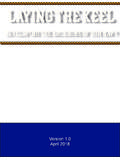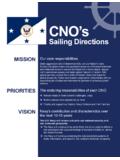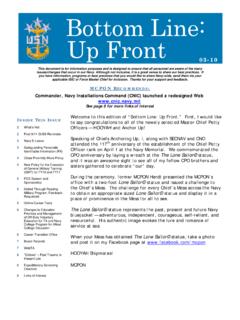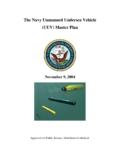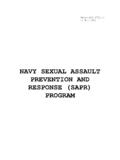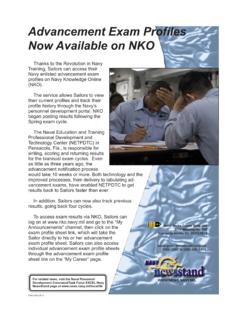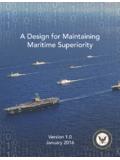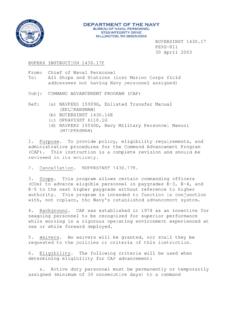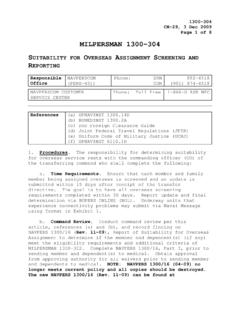Transcription of COMMAND MASTER CHIEF CHIEF OF THE BOAT …
1 COMMAND MASTER CHIEF . CHIEF OF THE boat . COMMAND SENIOR CHIEF . CHARGES. INTRODUCTION. 1. OFFICIAL CHARGES. The charge process is designed to prepare, educate, and evaluate those senior enlisted leaders that will have the potential to impact the men and women of the United States Navy by assuming the duties and responsibilities of a CMC, COB, or CSC. The charges were written and collaborated together by the MCPON, FLTCM, FORCM, regional MASTER chiefs, and CMCs who are currently performing these duties in the fleet. 2. CANCELLATION. Senior Enlisted Leader Development Guide. 3. APPLICABILITY. Charge book completion is mandatory for submission of the CMC, COB, and CSC program. A waiver to exclude these charges must be approved at the Region, Force, or Fleet MASTER CHIEF level.
2 4. HOW TO COMPLETE. It is important that the charge book be completed in its entirety. Candidates will complete the charge book as outlined in the Introduction portion of each individual section. a. Before getting started, candidates will read through the entire charge book and then schedule a CDB with their respective COMMAND SEL. This is critical in preparation as the CMC, COB, or CSC will provide clear guidance and mentorship on completing these charges successfully. b. All candidates must meet any additional requirements as specified in the current naval administration message or policy/guidance promulgated for selection to the CMC/COB/CSC. program. SCPOs who complete the charge book and are selected for CSC will not be required to submit a new package if selected to the rank of MCPO and wish to submit a NAVPERS 1306/7 for selection to the CMC program.
3 C. Though actual performance of each task is always preferable to observation or discussion, some items listed may not be able to be performed. For those tasks non-applicable or that are unable to be completed due to mitigating circumstances, 2. make an entry on the waiver form (in the back of the charge book) and get each item approved by a region, FORCM, or FLTCM. d. Upon completion of section 400 (CMC/COB/CSC)/500 (COB. only), candidates will obtain their COs approval signature on the final charge card. Once signed, a review board will be coordinated and set up by the candidate's SEL. The review board process is mandatory and will be conducted as follows: (1) Panel will consist of three members. (2) Members will hold the NECs (9580/9579/9578). (3) The senior member will act as the chair person.
4 (4) Each panel member will have at least 1 year successful experience. (5) Panel members will interview the prospective CMC/COB/CSC. (6) Questions from the panel will focus on: Areas outlined in the charge book;. Personal experiences; and Ensuring candidates are well prepared and possesses the leadership qualities necessary to perform the demanding duties of a CMC, COB, or CSC. (7) Upon completion of the panel review the chairperson will make one of following recommendations: FULLY READY. Candidate is fully ready and prepared to meet the high demands and challenges of the CMC/COB/CSC. leadership role;. 3. REQUIRES ADDITIONAL TRAINING. Candidate requires additional training and mentorship, and is recommended for a re-board with a no later than date. (Note: The same panel members will host the re-board.)
5 ; or NOT READY. Candidate is not ready at this time for the high demands and challenges of the CMC/COB/CSC. leadership role. Recommend reapplying next year. (8) The chair person will notify the member, the member's SEL, and the FLTCM in the candidates' immediate chain of COMMAND . (9) Each panel member will sign the COMMAND MASTER CHIEF Selection Nomination Form. Once complete, and the panel recommends full support, the candidate can then submit their package along with the form. (10) If a candidate is not selected by the CMC/COB/CSC. selection boards the following will apply with regards to the charge book process: The Charge book will remain good for 2 years;. A new panel review must be conducted for each year and a new COMMAND MASTER CHIEF Selection Nomination Form must be submitted with the candidates' application.
6 Panel members will conduct the review process as outlined in OPNAVINST ; and If a candidate fails to select 2 years in a row than a new charge book must be completed in its entirety. e. COB. Section 500 to the charge book is specific to the COB (submarines). This section covers additional prerequisites, practical factors and task performance items that are necessary to perform the duties as COB. 4. 5. QUALIFIER. Qualifiers must currently hold the position and Navy Enlisted Code (NEC) of CMC (9580), COB (9579), or CSC. (9578). Qualifiers must have at least 1 year of successful . experience and evaluations with promotion recommendations of PROMOTABLE or higher and with no less than a in any performance trait block, over the course of the last three evaluation cycles.
7 6. CONTENTS. This charge book is divided into six sections. Section 100 (Fundamentals) contains the fundamental knowledge or book learning necessary for satisfactory understanding of the CMC/COB/CSC position, duties, and responsibilities. Section 300. (Practical Factors) contains theory and concept that will apply the fundamentals to the process. Section 400 (Task Performance). lists the task that will be required to satisfactorily perform to achieve final qualification. Section 500 list (COB specific). additional prerequisites, practical factors and task performance required to satisfactorily perform to achieve final qualification. An oral board to determine candidates' readiness for the CMC/COB/CSC program will be documented on enclosure (2). of OPNAVINST 5. CHARGE BOOK REFERENCES.
8 1. OPNAVINST (Series) COMMAND Sponsor and Indoctrination Program 2. OPNAVINST (Series) Ombudsman Program 3. Navy Family Ombudsman Program Manual 4. OPNAVINST (Series) Navy Enlisted Retention and Career Development Program 5. NAVPERS 15878(Series) Bureau of Naval Personnel Career Counselor Handbook 6. CNO Guidance 7. SECNAVINST (Series) Awards Manual 8. MILPERSMAN 1440-060 Perform To Serve (PTS). 9. MILPERSMAN 1306-618 Class A School and Rating Entry Requirements 10. Career Information Management System (CIMS) Users Guide 11. MILPERSMAN 1160-120 High Year Tenure 12. MILPERSMAN 1920-030 Involuntary Separation Pay (Non- Disability) Definitions and Policy 13. Enlisted Distribution Verification Report (EDVR) Users Manual 14. OPNAVINST (Series) Physical Readiness Program 15.
9 OPNAVINST (Series) Drug and Alcohol Abuse Prevention and Control 16. OPNAVINST (Series) Navy Equal Opportunity (EO). Policy 6. 17. OPNAVINST (Series) Navy Fraternization Policy 18. OPNAVINST (Series) Sexual Assault Victim Intervention (SAVI) Program 19. SECNAVINST (Series) Personal Financial Management (PFM). 20. OPNAVINST (Series) Exceptional Family Member (EFM). Program 21. MILPERSMAN 1300-700 EFM Program 22. SECNAVINST (Series) Family Advocacy Program (FAP). 23. OPNAVINST (Series) Suicide Prevention Program 24. MILPERSMAN 1770-120 Reporting Requirements for Suicides, Suicide Attempts, and Suicide Gestures 25. SECNAVINST (Series) Department of the Navy policy on Hazing 26. OPNAVINST (Series) Casualty Assistance Calls and Funeral Honors Support Program Coordination 27.
10 MILPERSMAN 1770-160 Casualty Assistance Calls Program (CACP). 28. MILPERSMAN 1770-280 Death Gratuity 29. OPNAVINST (Series) Operational Risk Management (ORM). 30. OPNAVINST (Series) Traffic Safety Program 31. OPNAVINST (Series) Navy Guidelines Concerning Pregnancy and Parenthood 32. SECNAVINST (Series) Department of the Navy Disabilities Evaluation Manual 33. MILPERSMAN 1306-1200 Limited Duty (LIMDU). 34. OPNAVINST Navy Standard Organization of the Navy 7. 35. OPNAVINST (Series) COMMAND MASTER CHIEF Program 36. CHIEF of Naval Operation Policy and Guidance 37. CHIEF Petty Officers Mission, Vision, and Guiding Principles 38. Winds of Change - Charlotte D. (Roberts) Crist 39. OPNAVINST (Series) Navy Safety and Occupational Health (SOH) Program Manual 40. OPNAVINST (Series) Special Incident Reporting 41.
